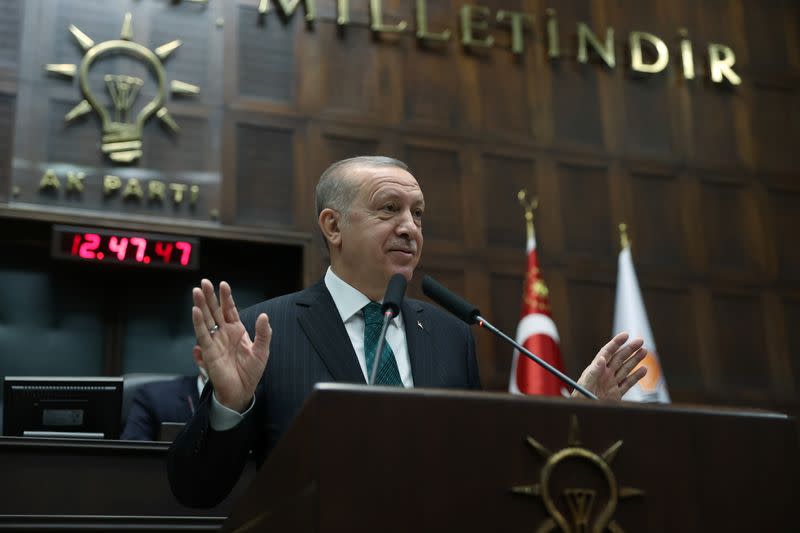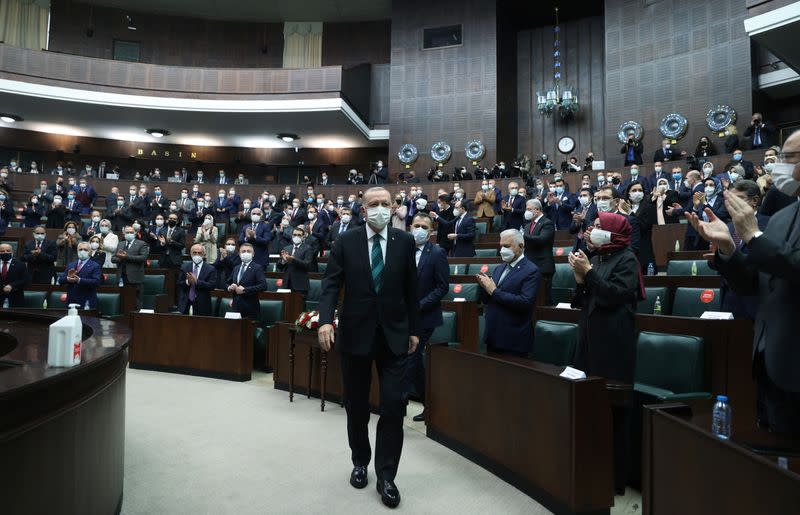Turkey's Erdogan says two-state solution only option for Cyprus
By Tuvan Gumrukcu
ANKARA (Reuters) - Turkish President Tayyip Erdogan said on Wednesday the only way to resolve decades of dispute over Cyprus was to establish two states on the island, and a federation favoured by Athens would not be on the agenda of upcoming talks.
On Monday the leaders of Greece and Cyprus said they would only accept a peace deal based on U.N. resolutions, rejecting the two-state formula supported by Turkey and Turkish Cypriots. Talks under United Nations auspices are planned for next month.
The U.N. is set to invite Cyprus's two communities and foreign ministers from the three guarantor nations - Greece, Turkey and Britain - to discuss how to move forward on an issue that has stoked tensions between Ankara and Athens and complicated energy projects in the eastern Mediterranean.
U.N. resolutions call for Cyprus' reunification under a two-zone federal umbrella. Previous attempts have failed to unite Greek and Turkish Cypriots on the island, which was split in a Turkish invasion in 1974 triggered by a Greek-inspired coup.
Erdogan said statements by Greece and the Cypriot government showed they were disregarding Turkish Cypriot authorities, recognised only by Ankara.
"There is no longer any solution but a two-state solution," he told lawmakers. "Only under these conditions can we sit at the table over Cyprus. Otherwise everyone should go their own way."
Though the basis set by U.N. resolutions has been reaffirmed over the years, Turkey and Turkish Cypriots have called for a confederation, or two-state union. Greek Cypriots - the island's internationally recognised government and an EU member - refuse to discuss this formula as it implies Turkish Cypriot sovereign authority.
On the back burner for years, the dispute has been brought into focus by energy exploration in the eastern Mediterranean and a dispute between Turkey and Greece over maritime boundaries.
The two countries resumed talks last month, but Erdogan said on Wednesday he could not meet Greek Prime Minister Kyriakos Mitsotakis. "Mitsotakis challenged me. How can we sit down with you now? Know your limit first. If you really seek peace, don't challenge me," he said.
In an interview on Wednesday, Mitsotakis said Athens was sticking to its positions, adding conditions were not yet ripe for a meeting with Erdogan but it was important to keep talking.
"If foreign policy is constantly instrumentalized for domestic political consumption, things become very difficult."
(Additional reporting by Ece Toksabay, Renee Maltezou and James Mackenzie; Editing by Dominic Evans and Steve Orlofsky)




